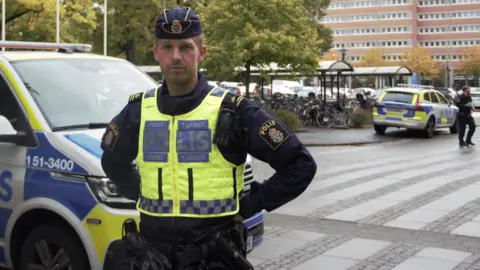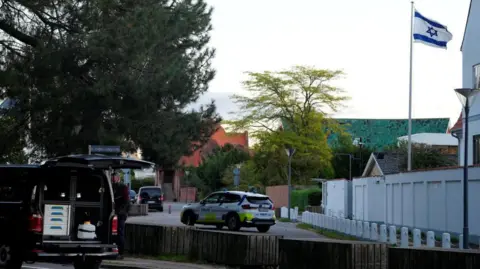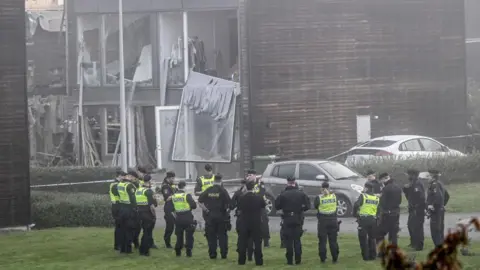Teenage guns for hire: Swedish gangs targeting Israeli interests
Written by BBC on October 17, 2024
The 13-year-old boy should have been in school last Thursday, instead of sitting in a police station in central Gothenburg. But police say he fired shots outside the offices of Israeli tech firm Elbit Systems.
“He was basically caught in the act,” said police spokesman August Brandt, who said the shots were being investigated as an “attempted murder and weapons offence”.
Kalleback on the outskirts of Gothenburg is a fairly sleepy residential neighbourhood with upmarket developments, a supermarket and a few offices.
Nobody was hurt and little more is known about why a child might have opened fire on an otherwise quiet Thursday morning, outside an Israeli company that sells defence and homeland security solutions.
But this was no isolated incident. In fact there have been several this year.

August Brandt of Swedish police said two officers were already at the scene when the shots were fired
Earlier this month, Israel’s embassies were targeted both in Sweden and neighbouring Denmark.
First there was a shooting outside the Israeli embassy in Stockholm, then two Swedish teenagers aged 16 and 19 were arrested in Copenhagen after hand grenades were detonated near the embassy there.
Nobody was hurt, but Sweden’s security service Sapo said immediately that Iran may have had a hand in both. Sapo head of operations Fredrik Hallstrom said Tehran’s involvement was an “objective hypothesis”.

Two teenagers were detained after grenades went off outside Israel’s Danish embassy earlier this month
Months ago Sapo accused Iran of recruiting Swedish gang members to carry out attacks on Israeli or Jewish interests.
Iran’s foreign ministry condemned the allegations as “unfounded and biased” and based on what it labelled misinformation emanating from Israel.
Many of the suspects have been teenagers, and some as young as 13 and 14.
“To understand why we see young Swedish teenagers attacking Israeli companies and embassies we need to first acknowledge that we have had an ongoing gang conflict here in Sweden for a long time,” says Diamant Salihu, an investigative crime journalist with Swedish public service television SVT.
One of Sweden’s most violent criminal gangs, known as Foxtrot, has brought a wave of violence to the streets of Sweden, often involving teenagers tasked with criminal errands ranging from shooting at the door of a rival, to detonating explosives to contract killings.
That spiralled in 2023 when Foxtrot gang leader Rawa Majid entered into a deadly feud with Ismail Abdo, a former friend who had become leader of a rival gang known as Rumba.
Spread of gang violence wrecks Sweden’s peaceful image
Iran may be behind attacks on Israeli embassies, Sweden says
When Abdo’s mother was murdered at her home in Uppsala, north of Stockholm, in September last year, it opened a darker, increasingly violent chapter in Sweden’s gang wars.
A pair who were 15 and 19 at the time were found to have carried out the murder.
Majid fled abroad facing an international arrest warrant, an Interpol red notice and a growing list of enemies.
Born in Iran to Kurdish Iraqi parents, he had moved as a child to Sweden with his family.
He left Sweden for Turkey in 2018 then moved to Iran last year.
Israeli’s Mossad intelligence agency alleged that Majid had been working with Iran for months. It has blamed both his and Abdo’s gangs for the recent attacks.
When counter-intelligence chief Daniel Stenling said Sapo “can now confirm that criminal networks in Sweden are proxies that Iran uses,” Iran summoned Sweden’s highest diplomat in Tehran in protest.
Sweden has also sought the arrest of Majid’s rival, Ismail Abdo, who was arrested in Turkey last May but reportedly released on bail.
Journalist Diamant Salihu says Tehran has sought to persuade the gang to “commit crimes for the regime,” although Abdo’s gang has denied involvement with Iran.
While the gangs themselves may have been put under pressure by a foreign power, that cannot be the case for the teenagers who have become caught up in the wider Swedish problem of gang crime.
An estimated 14,000 people in Sweden are caught up in criminal gangs, according to a police report from this year, and a further 48,000 people are said to be connected to them.

Gang violence has claimed many innocent lives in Sweden in recent years
“Today’s 13- and 14-year-olds who commit these grotesque offences were three or four years old 10 years ago,” conservative Prime Minister Ulf Kristersson told a televised debate of party leaders on public TV last weekend.
The debate turned into a blame game between the centre-right coalition currently in power and their predecessors on the centre left.
Social Democrat former Prime Minister Magdalena Andersson called for a “completely new approach” but Kristersson said “a very large extent of this is a problem linked to poor integration; and the integration problem is built on too high immigration”.
A disproportionate amount of gang members are men from immigrant backgrounds, but this has shifted, to the extent that Diamant Salihu says young people and adults from ethnic Swedish backgrounds are increasingly becoming involved.
Criminology specialist David Sausdal of Lund University, in the south of Sweden, says it has become increasingly difficult to monitor networks as they have become fragmented online, dragging people into a “gang gig-economy”.
“The people involved in it are just hired guns, paid for services. They deliver a pizza or a hand grenade as good as they can.
“They’re not super talented at it, they’re not motivated by inner hate or conflict as such. They’re just doing a job.”
It is that kind of change in Swedish society that is worrying police and politicians alike.
Justice Minister Gunnar Strommer has spoken of three parallel threats to Sweden’s security – terror, state actors and organised crime.
But the latest gang attacks, in David Sausdal’s words, go against conventional understanding of what has previously driven serious crime.




